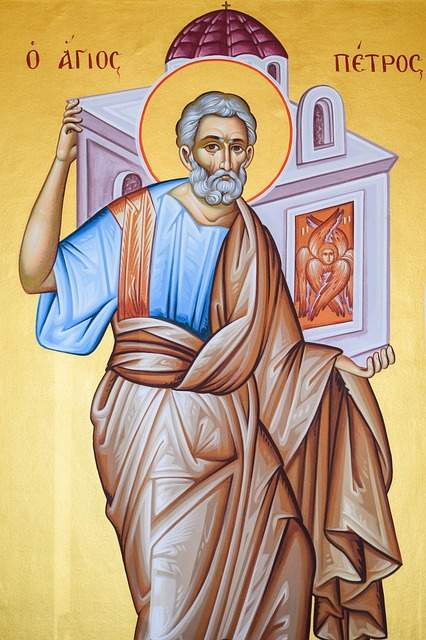Ogun is the chief of the warriors, the God of War, blood, and iron, similar to the spirit of Ares in Greek mythology. He is the patron of civilization and technology. Ogun is responsible for tools of progress like farming equipment and surgeon’s knives, and commands the leaders of society, such as policeman, doctors, and the military. As such, he is mighty, powerful, and triumphal; yet, he can also be dangerous and destructive.
It is Ogun who is said to have led and given power to the slaves for the Haitian Revolution of 1804. He is called upon now to help people obtain a government more responsive to their needs. In addition, he is often called upon to bring work to the unemployed.
Ogun gives strength through prophecy and magic.

He is associated with locomotives, and offerings are often made to him at railroad tracks. A favourite offering to Ogun is three railroad ties.
Associations:
- In Candomble, he is associated with St. George, the dragon slayer
- In Lukumi, Santería, and Palo Mayombe, he is syncretized with St. Peter
- In Voodoo, St Joseph
- Ogou Feray is syncretized with St. James the Greater (St. Jacques Majeur) in the Vodou tradition.
Family
Ogun is one of the husbands of Erzulie and is a husband of Oshun and Oyá in Yoruba mythology.
According to legend, Ogun is a son of Yemaja (Yemayá) and Orungan.
ABOUT Ogun
The god of war. He is a warrior and a powerful spirit of metal work, as well as rum and rum-making.
In Haitian Vodou Ogun is known as Ogou, and consists of an array of manifestations; most carry the aspect of iron smithing and tools from the Yoruba tradition.
The Ogou guard the badji, the sacred altar of the Vodou temple. He carries an iron saber and wears a red sash.
Ogou is also the god of pioneering, intelligence, justice, medicine, and political power; these are associated with the symbol of the tool that can “advance humans’ mastery over the environment.
Ogou Feray is the god of war.
Other manifestations of Ogou are Ogou Badagri, Ogou Balenjo, Ogou Batala, and Ogou Je Wouj.
Ezili Freda Daome is the female counterpart to Ogou.
Ogou Feray is syncretized with St. James the Greater (St. Jacques Majeur) in the Vodou tradition. He is a warrior spirit and protects the Vodou community; he guides Vodou followers against their enemies. He is symbolically covered in iron and may not be harmed by his enemies. As in Africa, his symbol is a piece of iron, a machete, or a knife. As in Africa, Ogou is revered among blacksmiths, many of whom are of Yoruba origin.
Other names:
- Oggun, Ogou, Ogún or Ogúm
Patronage:
- Ogun is the god of war, iron, fire, metalworking, politics and technology.
Offerings & Symbols:

- His symbols are iron, the dog and the palm frond. They symbolize Ogun’s role in transformation, mediation, and function.
- His ceremonial colours are navy blue or dark blue and green
- His favorite offerings are spitting cobra (blacksnakes), Clarias submarginatus (a species of catfish), alligator pepper, kola nuts, palm wine and red palm oil, small rats, roosters, salt, snails, tortoise, water, yams. He is also noted to like women and alcohol. Ogun enjoys blood offerings, it is considered inadvisable to petition Ogun with a bleeding wound or while menstruating.
In all his incarnations Ogun is a fiery and martial spirit. He can be very aggressively masculine but can rule the head of female, or effeminate male initiates to whom he takes a liking. He is also linked with blood and is for this reason often called upon to heal diseases of the blood.
In Vodou ceremonies followers of Ogou wear a red shirt, pants, and scarf. A follower of Ogou in a possession trance is offered Haitian white rum during the ceremony. In some ceremonies, rum is burned in a container to allow Ogou to “wash” the hands of the followers.
Make Your Own Ogun Oil (St. John the Baptist Holy Oil)
Use Ogun oil for protection from enemies, defense from evil influences, and to remove barriers. Use the following essential oils:
- Eucalyptus leaves
- Rosemary leaves
Add 2 tablespoons of each herb to 2 ounces of olive oil. Add a piece of rock salt to the final mixture to honor the orisha Ogun.
